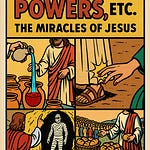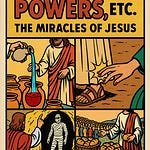Sister Rose knocked on the office door with the toe of the navy work shoes that matched her modest nun’s habit. I could see through the glass door that her hands were full. Braced against her chest, she held a basket filled with plastic Christmas ornaments in one arm. In her other hand she carried a three foot artificial tree by the treetop. Her navy polyester pants, I noticed, were dusted with the fake tree’s artificial snow.
It was the week before Thanksgiving, and I was serving as a chaplain at Trenton State Prison in New Jersey. Sister Rose was my supervisor. Forget the stereotype of the imperious, officious nun rapping students’s knuckles with the ruler in her hand and wearing a habit as black as her mood. Sister Rose could have easily been wearing a gaudy holiday sweater and teaching preschool. She was playful and innocent, both an ill-fitting fixture of the prison and absolutely perfect for it too.
She was constantly shushing inmates to use their inside voices and the most pedestrian obscenity flushed her cheeks with crimson.
“Sister Rose— she’s like Mister Rogers without the Land of Make Believe,” one of the inmates told me during my orientation.
I got up from my desk in the chaplaincy office and opened the door.
“What do you got there?” I asked her.
“Some volunteers from the Baptist Church donated it to us so that the boys could put up a Jesse Tree for Advent.”
Sister Rose always called the inmates boys, like it was her stubbornly gracious way of imputing to them a goodness they had lost.
“A Jesse Tree?” I asked, “What’s a Jesse Tree?”
Not having grown up in the church, I immediately and irrationally thought of Jesse Katsopolis, Uncle Jesse, played by John Stamos in Full House.
“I didn’t know either,” she replied, “But the Baptist folks said it was a way of “Putting Christ back into the Christmas tree.””
“Oh boy,” I thought.
“How so?”
“Well, during bible study every day, we’ll invite one of the boys to choose an ornament from the basket. See— each one is decorated with a name and each name is the name of a family member from Jesus’s family tree. We’ll have to do several each bible study if we’re going to hang all the ornaments. Matthew lists forty-two generations in his genealogy of Jesus.”
“Three sets of fourteen,” I added, incapable of resisting the urge to show-off.
She nodded.
“We’ll have them take turns picking an ornament, placing it on the tree, and then reading the biblical passage that corresponds to that ancestor of Jesus. The Baptist folks didn’t really give me any more instructions, but it sounds simple enough. What could go wrong?”
The answer to her question arrived only a couple of hours later when we gathered in the intake and orientation room. A few of the inmates had already arranged two dozen metal chairs into a circle and placed a paperback bible on each one. The men arrived wearing their beige jumpsuits. After the opening music and a simple, sincere prayer offered by an inmate who had arrived only that morning, Sister Rose explained the Jesse Tree to the boys. Barone threw us a bone by volunteering to go first. Barone worked in the chaplain’s office. He’d been the head chef in a prix fix Italian restaurant until he got busted running drugs out of the kitchen. Barone rubbed his nose, sauntered up to the Christmas tree, and pulled a plastic ornament out of the basket. It hung by green yarn on his index finger as he peered at the name on it.
“Ruth,” he read aloud, “It says Ruth.”
“Hmmm,” Sister Rose said, suddenly discovering a complication in her plan, “We don’t have time to read the whole Book of Ruth. Perhaps we can summarize it.”
“I’m Catholic,” Barone said, “They don’t teach the Bible in the Catholic Church. I don’t know any Ruths.”
Sister Rose frowned at the Catholic dig and then turned to me.
“Pastor Jason, why don’t you briefly tell us about Ruth?”
I sat up, silently praising God that Barone had not pulled the ornament labeled Abijah.
“Well,” I said, “Ruth is the grandmother of Jesse so she’s King David’s great-grandmother. She was a Gentile actually, a Moabite.”
“A what?” the inmate named Hector asked.
“A Moabite. Ruth was from Moab.”
“Mowhat?” the newly arrived inmate asked.
“Moab— it’s where Jordan is today. It means “from Dad.”
“From Dad? That’s a stupid name,” said Barone.
“It’s named after the son of Lot,” I explained, “After God destroyed Sodom, Lot and his two daughters hid in a cave. Nine months later Lot’s eldest daughter gave birth to Lot’s son. She named him, Moab— from Dad.”
“Damn, he should be in here with us,” Christopher with Cornrows said.
“I been with Christopher’s Mom— what’s that called in Hebrew?” another inmate shouted. The boys all laughed.
“Christopher’s Mom visited me yesterday.” another inmate joked, “What’s that called in Hebrew?”
“Conjugal” another answered.
Sister Rose’s cheeks flushed as she guided Barone’s hand to the tree, hung the ornament, and gestured for him to return to his seat.
“Why don’t we have a volunteer to pick another ornament for the Jesse Tree?”
An older inmate named Grady got up. He put one hand on his lower back as he leaned over and slowly selected an ornament like it was an orange he was inspecting at a fruit stand.
“Tumar,” he said.
“Tamar,” Sister Rose corrected him.
“Tamar,” Grady repeated, “Who’s he?”
“It’s a she,” Sister Rose corrected him again.
Perhaps sensing Grady’s limited literacy, she looked at me and said, “Pastor Jason, you did such a thorough job with Ruth why don’t you tell us about this other person on Jesus’s family tree.”
“Um, Tamar is the daughter-in-law of Judah, Jacob’s son,” I said.
“And? Barone said.
“And what?”
“What’s her story? Telling me she’s somebody’s daughter-in-law isn’t a story.”
I bit my lip and pressed ahead.
“Okay— so she’s Judah’s daughter-in-law but Judah’s son is dead. She’s a widow. Her husband had been struck down by the Lord for practicing coitus…never mind. Anyways, she disguised herself as a prostitute and slept with her father-in-law. When Judah hears Tamar had prostituted herself, he orders her to be burnt alive. Only at the last minute Judah discovers that he had been Tamar’s client and that her baby, Perez, was his son. Matthew mentions him too in Jesus’s family tree, Perez.”
They all stared at me silently for a couple of beats not sure if I had just concocted such a wild story.
“How could you not recognize a prostitute was your own daughter-in-law?” an inmate named Jalen pondered aloud.
As it turned out, it was a question the congregation at Trenton State felt they possessed more than ample expertise to debate.
“This one time…” Barone started to say before Sister Rose stared daggers at him.
“I can’t believe Jesus has a prostitute in his family!” another inmate marveled.
“Two actually,” I said, “Ruth’s husband’s mother was a prostitute too— she was also a traitor.”
You could tell from the expression on Sister Rose’s red face that whatever was running through her mind it was not the Christmas spirit.
Barone elbowed my arm and laughed, “I think those Baptists were punking Sister Rose with this Jesse Tree bit.”
“I didn’t even mention how Ruth convinced Boaz to marry her,” I said to Barone.
“How’d that go?” Barone asked.
And somehow, by some miracle, I resisted the urge to analogize to Monica Lewinsky.
Desperate to rescue the moment, Sister Rose pleaded: “How about we sing “Away in the Manger?”
“We need to do one more ornament,” the newly arrived inmate said.
His name was Steven. He was strung-out skinny with a faraway look and a thin mustache.
“You said we’d do three today,” the Steven said.
Still blushing, Sister Rose nodded and gestured for him to come up.
“Abraham,” he read.
“Surely, many of you know about Father Abraham, right?” Sister Rose said like a preschool teacher announcing nap time. She looked relieved the rookie had chosen a run-of-the-mill name.
“Yeah, Abraham,” Deion said, “He’s the one who passed off his old lady as his sister, had a kid with his slave girl, and would’ve slit his son’s throat if an angel of the Lord hadn’t stopped him.”
“Man, I thought my family was messed up! JC’s family tree is jacked up!” an inmate shouted, a declaration that kicked off a cacophony of four lettered jokes and testimonials about their own seedy families and sordid relationships.
The child of Mary is the Lamb that lies down among wolves.
Mary’s boy, the one upon whom God’s Sprit rests with the fullness of the Spirit’s gifts, whose word kills and makes alive, who himself cut down and cast into the fire of death, he comes from the family of Jesse.
As a shoot sprouting from the knotted scar left by an axe, Mary’s child comes forth from the stump of Jesse.
Jesse was such a piss poor parent that when the prophet Samuel traveled to Bethlehem to find and anoint the next king of Israel, Jesse completely forgot about his youngest child. Just imagine forgetting one of your children. Jesse paraded his seven sons before the prophet.
“No, no, no,” the prophet said to each of the men.
“Got any more?” Samuel asked.
Then, almost as an afterthought, Jesse said, “Oh, yes, I forgot. There is one more, now that you mention it. He’s out with the sheep.”
Almighty God could’ve chosen any family.
But God chose this family.
Jesse’s son David was a power-hungry peeping-tom who should’ve been #MeToo’d out of the story of salvation. David spied on Bathsheba bathing on a rooftop one evening. Presumably David didn’t stop there because he promptly arranged for her husband, Uriah, to be murdered.
Bathsheba— she’s another name on the Jesse Tree. Actually, not her name exactly. The way Matthew puts it in his Gospel: “And David was the father of Solomon by the wife of Uriah.”
Ouch.
Their grandson, Rehoboam, lost most of the kingdom David had established. He lost his kingdom through vanity and greed. It’s no surprise the prophet Isaiah refers to their family tree as a stump. It’s one story after another of bad fruit and faithlessness. From the very beginning even— Abraham wasn’t righteous at all but was reckoned so only on the basis of faith.
The line of Jesse winds its way to Joseph.
Joseph, who the Bible makes no bones to hide, wasn’t the father of Jesus at all. He was just the fiancé of the boy’s mother, Mary, the teenage girl with a child on the way and no ring on her finger.
Her child, Jesus— his very pedigree proclaims broken humanity’s need for a mighty savior and a gracious God.
“Man, I thought my family was messed up! JC’s family tree is jacked up!”
Sister Rose’s cheeks were as red as Santa’s suit so I spoke up and attempted to rescue the unruly situation.
“Jesus didn’t belong to the nice clean world of Tom Brokaw or Oprah Winfrey. Jesus didn’t belong to the honest, respectable world of the NY Times or the Trenton District Attorney. Jesus belonged to a family of murders and cheats and cowards and adulterers and liars and garden-variety sinners.”
“He belongs to people just like us,” Barone said, suddenly serious.
I nodded, “He comes from sinners for sinners.”
“How the hell does that help me?” Steven, the newly arrived inmate asked, “How does that help any of us?”
His faraway look had receded. He appeared like he was waking up into a nightmare and help was exactly what he was seeking.
“I’ve done some real bad things, preacher. How does Jesus coming from people like me do anything at all for me?” And he pointed at me, “Your family might be a hot mess too but that doesn’t help me at all.”
“Yeah,” Grady added, “If Jesus is just like us, no different than us, then he’s in the same situation as the rest of us. That don’t help me. That he belongs to people like us— it’s a nice thought but it ain’t good news.”
“It’s a good point,” I conceded.
This Tuesday I got a call from someone who worships with us online. Debbie told me that her ninety-seven year old father was in Mary Washington hospital in Fredericksburg. After several days of unresponsiveness he’d woken up at five that morning and announced unexpectedly that he wanted to speak with a Methodist minister.
I took the train down on Wednesday morning to avoid the traffic on ninety-five. When I got to his room, I discovered that Merle is almost completely deaf. His daughter had a stack of index cards and a supply of black sharpies.
She introduced us. Because his hearing loss made our communication necessarily one way, at first I listened to him. Merle’s initials are “MF” and he’d always liked that his initials implied that he was a bit of a hard-ass and a stoic. The persona suggested by his initials went with the purple birthmark on his bottom lip that made him look like he’d just walked away from a fight. Indeed, he told me, he’d fought in World War II, Korea, and Vietnam before settling down to carry mail.
I listened as he told me about his life and his regrets, the chief one being a wife he left for another.
“I don’t know whether or not I’m fit for heaven,” he said to me, “Do you?”
I smiled and immediately thought of that verse from the Christmas carol: “And fit us for heaven to live with thee there.”
Notice, the final verse of “Away in the Manger” is addressed to Jesus.
We’re not the ones fitting ourselves for heaven.
“I don’t know if I’m fit for heaven,” Merle said to me.
“Do you know?” he asked me.
I nodded.
And I mouthed, “Yes.”
Taking that as my cue, I moved to apply the certainty of faith to him. But because of his deafness, I had to write out all my priestly parts.
The words had to take flesh. Like Sheriff Rick Grimes in Love Actually, I wrote it all out by hand in clear block letters with thick black ink, and then I numbered them, and then, standing next to his bedside, I held them up to him, one at a time, to read.
“#1— Merle, do you repent of all your sins?”
And he nodded as earnestly as anyone I’ve ever seen.
“#2 — Do you put your whole trust in Jesus Christ and his grace alone?”
“I do,” Merle said like he was promising a wedding vow.
Cards #3 and #4 said, “Merle, in the name of Jesus Christ and by his authority alone, I announce to you the entire forgiveness of all your sins.”
Card #5— “You’re home safe in Jesus Christ. Trust in his grace.”
And then I prayed with him, shouting it straight into his earball.
And then I made the sign of the cross on him and I blessed him.
When I left him, he was clutching those cards like they were his ticket for a journey.
Here’s the thing— Grady was right.
None of what I inscribed on those index cards is true if Jesus is but another name in the long line of Jesse.
Even if Jesus is the most exceptional one in Jesse’s line, even if he’s the only righteous one on that family tree, if he’s just like us— if he’s merely human— none of the promises I made to Merle are true.
The forgiveness of all your sins?
Jesus can’t do that if he’s just like us. And I certainly can’t promise it. Indeed making such a promise is a sin in its own right if Jesus is just flesh of our flesh and bone of our bone.
Fit us for heaven?
He could be a mighty prophet or a great high priest or a teacher par excellence and bringing you home safe, fitting you for heaven, is still too tall an order if Jesus is not Lord.
He is not our savior if he is not also God.
So hear the good news.
It’s right there, hiding in plain sight, on the lips of the prophet Isaiah:
“In that day the root of Jesse, who shall stand as a banner for the peoples…”
Notice— Isaiah’s prophecy, which begins with the image of a shoot sprouting up from the stump of Jesse, ends with the image of the root of Jesse.
Isaiah’s prophecy, which begins with the image of a shoot sprouting up from the stump of Jesse, ends with the image of the root of Jesse.
In other words, the prophetic word disclosed to Isaiah is not Mary’s child will be from Jesse’s line. That’s not news. David himself already knew as much. No, the bottomless mystery, the unfathomable wonder, the good news is that the child of Mary who is the fruit of Jesse’s tree is also simultaneously, paradoxically the root of Jesse.
Jesus is not only an offshoot of Jesse’s tree.
He is its source.
The son of David is the root of David’s father.
That is, Mary’s child is also Mary’s creator.
Though we’re counting down the days to his birth, the truth is Mary’s boy has no beginning.
As Karl Barth says, whatever else God may be, God is the man who arrived announcing, “You are forgiven.”
After the gray-haired inmate Grady had registered his critique of the Jesse Tree, Sister Rose had been about to press play on the cassette player and move us along with caroling.
But she turned around from the blue boombox and she took a deep breath and she smiled at them all.
And she said,
“Never forget, boys. The genealogy of Jesus is also the historicity of God. Long before God is for you in Jesus Christ, God chose to be with— from— people just like you. Think about that boys— the love that moves the sun and the stars wanted to be with people just like you. Whether it’s his family tree or the tree on Golgotha, the message is the same. God is grace, all the way down.”













